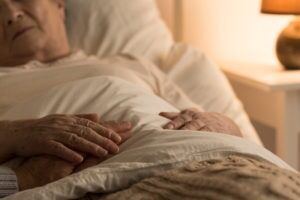Bedsores occur when people are stuck in one resting position for too long, and the pressure on their skin forms a wound. They frequently happen to bed-ridden individuals, but they can happen from sitting too (e.g., a wheelchair). Bedsores are a painful medical condition that can be slow to heal, especially without good nutrition.
Poor nutrition is often associated with poor wound management and recovery because the body requires balanced nutrients, including proper protein, vitamin, mineral, and fluid intake. Understanding the importance of nutrition in managing bedsores and ensuring bedsore patients receive proper nutrients are two keys to help promote optimal healing and recovery.
Because bedsores are the result of continual pressure caused by immobility, you could hold a nursing home responsible for negligence. A nursing home abuse lawyer in your area will explain how to prove lack of proper nutrition and forced immobility in the facility you trusted to care for your elderly loved one.
How Pressure And Time Cause The Formation Of Bedsores
The Mayo Clinic points to three factors that cause bedsores to form:
- Pressure — typically the result of sitting or lying in the same position for prolonged times. The continual pressure restricts blood flow and causes the damage or destruction of healthy skin and tissue.
- Friction — the result of skin continually chafing against cloth, bedding, medical equipment, or rough surfaces including chairs. Ongoing friction can make skin increasingly fragile, a condition that worsens when skin is damp or moist.
- Shear — similar to friction, shear is the result of two surfaces pulling against each other while moving in opposite directions.
Immobility, incontinence, and poor nutrition can all contribute to the development of bedsores and cause them to be slow to heal.
How Good Diet And Nutrition Support The Healing Process
According to Cleveland Clinic research, everyone needs proper nutrition for optimal health. Calories and protein provide needed fuel, while protein provides energy. In addition, healthy bodies require a proper balance of vitamins and minerals via a healthy diet.
Elderly nursing home residents need the right intake of nutrients at all times. As they recover from a wound or injury, their bodies require extra intake of the building blocks of good nutrition: calories, protein, vitamins, and minerals.
According to the Mayo Clinic, this means nursing home residents struggling to recover from bedsores will require the following daily nutrients through their diet:
- 5 servings of whole grains
- 2 servings of vegetables
- 3 servings of fruit
- 5-8 servings of protein
- 3 servings of dairy
Patients who have difficulty meeting these needs through their diet may require supplemental nutrition aids along with a daily vitamin.
How Poor Nutrition Prevents Healing
According to the International Journal of Molecular Sciences, wound recovery is a complex biological function. The body’s ability to heal can be inhibited by protein loss, a weakened immune system, and poor nutrient intake.
Further research cited in the publication Nutrition in Clinical Practice reviews the connection between malnutrition and wounds, including bedsores, that are slow to heal. Lack of proper nutrition can mean a decrease in tensile strength and a simultaneous increase in the risk of infection.
Many nursing home residents who are recovering from bedsores could benefit from proper nutrition and the critical role it plays in wound healing.
The Nursing Home’s Role In Proper Nutrition
Federal regulations require nursing homes to ensure each resident has their nutritional needs met. According to 42 CFR § 483.60, residents’ needs and preferences must both be taken into account when planning and preparing meals.
Meals and snacks must be:
- Nourishing
- Palatable
- Well-balanced
- Nutritious
Because each resident will have different needs depending on their health, this can be a complex undertaking. For this reason, the nursing home must work with a qualified dietician at all time.
The Role Of Nursing Home Staff In Proper Nutrition
Elderly nursing home residents are vulnerable, and their nutritional needs can vary greatly. While recovering from a bedsore, a resident’s needs will also differ from their usual daily requirements.
Factors that lead to poor nutrient intake in nursing homes can include:
- Overcrowded facilities
- Resident’s loss of appetite
- Inadequately trained staff
- Overdependence on nutrition supplements
- Failure to provide assistance eating, as needed
Caregivers in these facilities should monitor every resident — particularly those in need of greater nutrition. The recovery of these residents can suffer under negligent situations such as missed or skipped meals and misunderstood dietary needs and concerns. In addition, each resident’s chart should contain information on their medical condition and specialized dietary needs.
Get Your Free Bedsore Case Review Today
If your elderly loved one suffers from the pain and debilitation of slow-healing bedsores due to lack of proper nutrition in their nursing home, our law firm can help you build a strong case for compensation. We will prove that improper nutrition due to negligence in managing bedsores contributed to their medical condition.
Contact one of our case review team members at Brown & Barron today to learn more about your compensation options.


